kottke.org posts about language
Oh my, I had forgotten about the Name of the Year site and how amazing it is. Each year, they collect the most unusual names in the world and pit them against each other in a March Madness-style bracket. Here are some of the names in the running for the 2015 Name of the Year:
Swindly Lint
Dr. Electron Kebebew
Flavious Coffee
Lancelot Supersad Jr.
Jazznique St. Junious
(A reminder…these are actual names of actual people. Somehow.)
Littice Bacon-Blood
Dr. Wallop Promthong
Infinite Grover
Genghis Muskox
Malvina Complainville
Beethoven Bong
Amanda Miranda Panda
Some Hall of Name inductees include Tokyo Sexwale, Nimrod Weiselfish, Doby Chrotchtangle, Tanqueray Beavers, and Vanilla Dong.
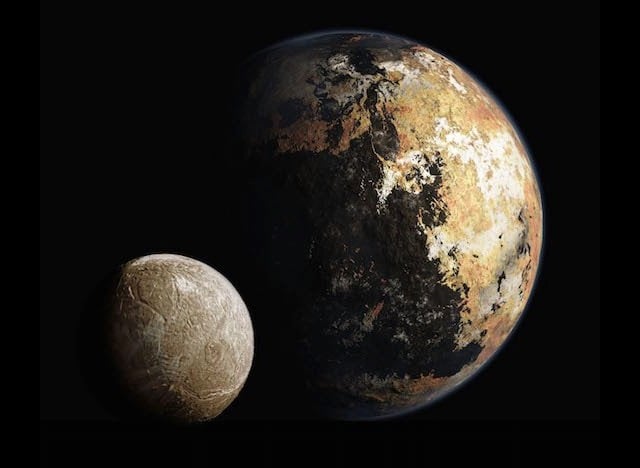
Ok, Pluto fans. They evicted Pluto from our solar system’s planetary pantheon, but a NASA mission launched in 2006 is nearing the dwarf planet with its cameras. We’ll soon have photos of Pluto that are much more high resolution than we currently have, which means scientists will need names for all the new geographic features. The Our Pluto site has been set up to help suggest and vote on names for these features. Naming themes include historic explorers, travelers to the underworld, and scientists and engineers. Go vote! (via slate)

James Joyce is the greatest writer the world has ever known. Arguably! He didn’t even bother confining himself to the known language. He created words of his own.
A few highlights from “17 Words Invented by James Joyce”:
Bababadalgharaghtakamminarronnkonnbronntonnerronntuonnthunnt-rovarrhounawnskawntoohoohoordenenthurnuk. This is Joyce’s most famous word creation. It’s from Finnegans Wake, and it’s supposed to sound like a thunderclap. Which it does. If you can figure out how to pronounce it.
Peloothered. This means you’re drunk. Someone calls you this in Ireland, and you know you’re blotto.
Smilesmirk. Girls on Instagram have basically perfected this one.
Update: Ryan Goodlett advises: “I’ve found after a handful of languages that Icelandic sounds the best.” Agreed! And Kevin Krebs suggests: “you’ll want to follow @FW_WOTD.” Michael Schwartz says: “You might want to try james Joyce or Kool Keith.” I got six out of ten. How embarrassing.



A project called Chinatown takes familiar logos like Pepsi, Starbucks, UPS, and Lego and translates them, imprecisely, into their Chinese equivalents.
It uses basic words for translation, such as “Caramel Macchiato” for “Starbucks” in order to maintain the visual continuity. By arranging the words this way, ‘Chinatown’ pushes viewers to ask themselves what it means to see, hear, and become fully aware. ‘Chinatown’ also demonstrates our strangeness to 1.35 billion people in the world, when you can’t read Chinese.
(via @pieratt)
One of the last interviews David Foster Wallace gave was with Bryan Garner, a lawyer and lexicographer who became friendly with Wallace due to their mutual love of language. That hour-long interview is reproduced in Quack This Way: David Foster Wallace & Bryan A. Garner Talk Language and Writing.
David Foster Wallace was at the center of late-20th-century American literature, Bryan A. Garner at that of legal scholarship and lexicography. It was language that drew them together. The wide-ranging interview reproduced here memorializes 67 minutes of their second and final evening together, in February 2006. It was DFW’s last long interview, and the only one devoted exclusively to language and writing.
It was Wallace’s piece featuring Garner in Harper’s, Tense Present, that cemented him as a favorite writer of mine, even before I tackled Infinite Jest. Wallace later expanded the essay to 62 pages in Consider the Lobster and Other Essays.
Thesis: the quality of every movie starring Samuel L. Jackson varies directly with the number of times he says “motherfucker.” I feel like somebody at 538 should get on this.
Whenever I think about how Sam Jackson says “motherfucker,” I can’t get this Supremes song out of my head.
Whenever you’re near, I hear a symphony
Play sweet and tenderly
Every time your lips meet mine, now, baby, baby, baby
You bring much joy within
Don’t let this feeling end
Let it go on and on and on, now, baby, baby, baby
Those tears that fill my eyes
I cry not for myself
But for those who’ve never felt the joy we felt (baby)
(via @igorbobic by way of @daveweigel)
Update: In mid-2013, Filmdrunk calculated that since joining Twitter, Samuel L. Jackson has spelled “motherfucker” no fewer than 151 different ways.
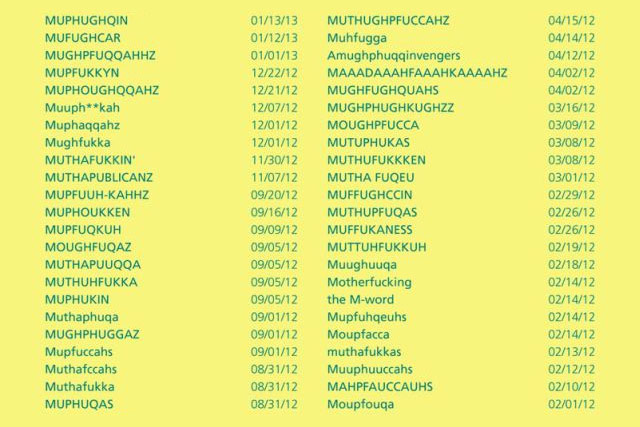
Hi, everybody! Tim Carmody here, guest-hosting for Jason this week.
In the Marvel comic Hawkeye #15, published in February, the title character was brutally attacked and deafened by a supervillain real estate developer trying to push the hero’s neighbors out of their apartment building in Brooklyn’s Bed-Stuy. (It’s a very special comic book.) This week’s issue, #19, took months to finish but finally picks up that story line. It’s mostly told in a combination of silent panels, American Sign Language, and half-intelligible lip reading. It’s already being talked about as a shoo-in for this year’s Eisner award for best single issue.
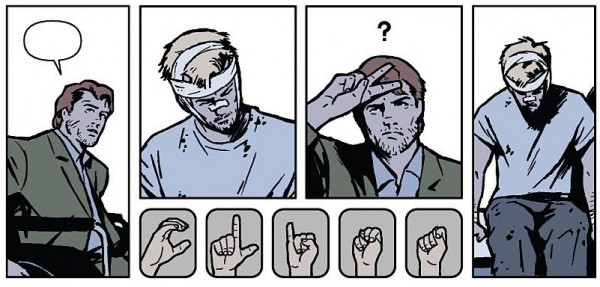
There are precedents here. Last year’s mostly-silent Hawkeye #11 was told from the point of view of a dog (named Pizza Dog), using symbols and maps to tell a kind of detective story. (That issue also won writer Matt Fraction and artist David Aja the Eisner.)
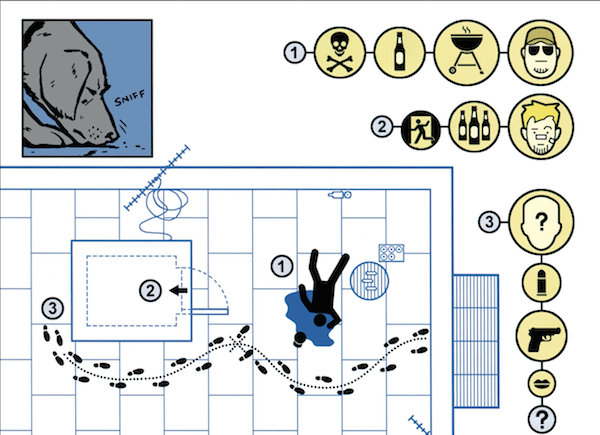
There’s also a silent issue of Daredevil by Brian Michael Bendis and Alex Maleev where the blind superhero is temporarily deafened by an explosion. And there’s two gorgeous mini-arcs of Daredevil by writer/artist David Mack, featuring Maya Lopez as Echo, Daredevil’s deaf, super-powered love interest and counterpart.

Hawkeye’s also been temporarily deaf twice before: once in the limited series Hawkeye, back in the 1980s (his use of a hearing aid made him a minor hero to hearing-impaired readers) and (it’s revealed in this new issue) also as a child, as a result of an injury implied to be caused by his abusive father. This is how Clint and his brother Barney are shown to know American Sign Language.
I’ve been interested in ASL for a long time for personal reasons, but also as a kind of “writing,” in the family-resemblance sense of visible language, that functions like speech.
Comic books, at least in print, are a silent medium by necessity. But it’s still harder to render ASL in comics than ordinary oral/aural speech, because it’s a language of movement, and we don’t have the conventions of speech bubbles and the alphabet.
What we do have is a graphic tradition of maps, signs, atlases, manuals, and other forms of everyday iconography to draw on. And those are largely what Mack used in Daredevil, and what Aja uses in Hawkeye.
It’s a sign that we, all of us, read signs everywhere, and every kind of reading can be used and incorporated in every other kind. The best way to stay true to what’s essential in a medium is to do your best to explode your way out of it.
Hi, everybody! Tim Carmody here, guest-hosting for Jason this week.
You probably know that Donald Glover (actor on Community, writer on 30 Rock) also has a rap career under the stage name Childish Gambino. You may not know that the name “Childish Gambino” comes from a Wu-Tang Name Generator.
That’s half of the reason I’m here - I’m dead serious. Like I met RZA and he was like, “you’re a cool dude, man - and your name is perfect for you! It’s like that computer had a brain!” But yeah, I put my name in a Wu-Tang name generator and it spit out Childish Gambino, and for some reason I just thought that fit.
Now here’s where things get a little weird. There are multiple, competing Wu-Tang name generators. (Of course there are.) Most of them seem to work the same way — they run a script matching your name’s characters with a decent-sized database of Wu-sounding words, kind of like a hash. But little differences in the scripts or in the database give you different results.
For instance, at recordstore.com, the “Original Wu Name Generator” (tagline “WE CAN WU YOU!”) spits back “Erratic Assassin” (for “Timothy Carmody”), while “Tim Carmody” yields “Well-Liked Assman.” These names are both awesome.
But the “Wu-Tang Name Generator” at mess.be (“Become a real Wu warrior, entah ur full name ‘n smack da ol’ dirty button”), which proprietor Pieter Dom says was made in 2002, is totally different. There, “Timothy Carmody” and “Tim Carmody” return “Shriekin’ Wizard” and “Gentlemen Overlord,” respectively. Now, while these definitely sound like Wu names, they are definitely The W to the other site’s Enter the 36 Chambers.
Here’s the weird part: both of these Wu-Tang name generators return the same name for “Donald Glover.” It is, of course, “Childish Gambino.”
Is it just a quirk that whatever difference crept in affects most names, but not Donald Glover’s? Did one of the sites hard-code that result in, to boost its credibility with people who heard the Childish Gambino story? Or is Donald Glover somehow necessarily Childish Gambino, across all possible Wu-accessible worlds, in the same way that “Clifford Smith” is always and only “Method Man,” even when he pretends to be an actor?
I don’t think we can ever know. But just as Russell Jones was Ol’ Dirty Bastard, ODB, Dirt McGirt, Big Baby Jesus, and Ason Unique as well as Osirus, I am content to be known by many names under the Wu.
(Dedicated to “Sarkastik Beggar” and “Lesbian Pimp.” Via @hoverbird.)
Update: The TLDR podcast did a follow-up to this story: The Mystery of Childish Gambino.
Watch actress Siobhan Thompson do 17 different British and Irish accents:
Much better done and more entertaining than this tour of British accents I featured back in April. (via @Atul_Gawande)
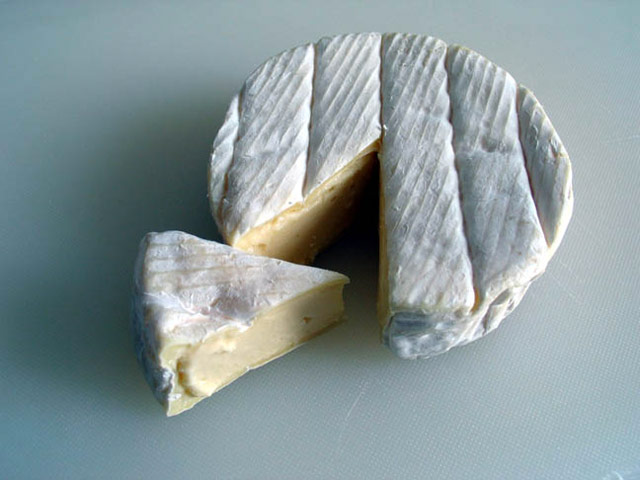
In France, pie charts are called “le camembert” after the cheese. Or sometimes “un diagramme en fromage” (cheese diagram). In Brazil, they are pizza charts. (via numberphile & reddit)
The Guardian has an interview with Adam Parrish, creator of @everyword, an automated Twitter account that’s been listing a dictionary’s worth of English words in sequence since 2007. @everyword recently reached the Zs and will complete and close tomorrow, June 6.
Words aren’t just things that we write and use in our speech. They are also things we think about individually. Like sex, weed, swag - when they’re not in a sentence, we can also think about them individually. Everyword raises that question of thinking about a word just from that perspective, as a social object.
On the other hand, because @everyword is inside an individual person’s Twitter stream, the words take on the context of whatever else is in the stream at the time. There’s the possibility of weird serendipitous interactions between a word in your stream and some other tweets. The word “super” might be tweeted, and then you read a tweet about a school superintendent or Superman movie.
Any Twitter account that gets you thinking about both the Platonist and the Dadaist dimensions of language at the same time is my kind of fun. And that’s a sort of fun that I associate with the Golden Age of Twitter, given its commingling of high and low, news and musings, humans and bots. That too is coming to a close:
In its early days, because of ven-cap funding, Twitter wasn’t thinking about monetization. They were just really encouraging developers to work with it and do interesting things. There was no concept of ads or promoted tweets. Now things are different. They’ve changed the API and some of the things that were easy to do are now difficult.
The flipside is, more people use it. As an artist, it’s disappointing that the medium has been converted into this very commercial, focused platform, but on the other hand I get to have a huge audience for an experimental writing project. It’s a huge privilege and I definitely have Twitter to thank for that.
It’s all cause for low-grade melancholy and a touch of anxiety. As Suzanne Fischer wryly tweets: “If the dictionary is finite, what else might be ending?”
James Somers says that we’re probably using the wrong dictionary and that most modern dictionaries are “where all the words live and the writing’s no good”.
The New Oxford American dictionary, by the way, is not like singularly bad. Google’s dictionary, the modern Merriam-Webster, the dictionary at dictionary.com: they’re all like this. They’re all a chore to read. There’s no play, no delight in the language. The definitions are these desiccated little husks of technocratic meaningese, as if a word were no more than its coordinates in semantic space.
As a counterpoint, Somers offers John McPhee’s secret weapon, Webster’s Revised Unabridged Dictionary, the bulk of which was the work of one man and was last revised in 1913.
Take a simple word, like “flash.” In all the dictionaries I’ve ever known, I would have never looked up that word. I’d’ve had no reason to — I already knew what it meant. But go look up “flash” in Webster’s (the edition I’m using is the 1913). The first thing you’ll notice is that the example sentences don’t sound like they came out of a DMV training manual (“the lights started flashing”) — they come from Milton and Shakespeare and Tennyson (“A thought flashed through me, which I clothed in act”).
You’ll find a sense of the word that is somehow more evocative than any you’ve seen. “2. To convey as by a flash… as, to flash a message along the wires; to flash conviction on the mind.” In the juxtaposition of those two examples — a message transmitted by wires; a feeling that comes suddenly to mind — is a beautiful analogy, worth dwelling on, and savoring. Listen to that phrase: “to flash conviction on the mind.” This is in a dictionary, for God’s sake.
And, toward the bottom of the entry, as McPhee promised, is a usage note, explaining the fine differences in meaning between words in the penumbra of “flash”:
“… Flashing differs from exploding or disploding in not being accompanied with a loud report. To glisten, or glister, is to shine with a soft and fitful luster, as eyes suffused with tears, or flowers wet with dew.”
Did you see that last clause? “To shine with a soft and fitful luster, as eyes suffused with tears, or flowers wet with dew.” I’m not sure why you won’t find writing like that in dictionaries these days, but you won’t. Here is the modern equivalent of that sentence in the latest edition of the Merriam-Webster: “glisten applies to the soft sparkle from a wet or oily surface .”
Who decided that the American public couldn’t handle “a soft and fitful luster”? I can’t help but think something has been lost. “A soft sparkle from a wet or oily surface” doesn’t just sound worse, it actually describes the phenomenon with less precision. In particular it misses the shimmeriness, the micro movement and action, “the fitful luster,” of, for example, an eye full of tears — which is by the way far more intense and interesting an image than “a wet sidewalk.”
It’s as if someone decided that dictionaries these days had to sound like they were written by a Xerox machine, not a person, certainly not a person with a poet’s ear, a man capable of high and mighty English, who set out to write the secular American equivalent of the King James Bible and pulled it off.
Don’t miss the end of the piece, where Somers shows how to replace the tin-eared dictionaries on your Mac, iPhone, and Kindle with the Webster’s 1913. (via @satishev)
Update: In the same vein, Kevin Kelly recommends using The Synonym Finder as a thesaurus.
Just look up a word, any word, and it proceeds to overwhelm you with alternative choices (a total of 1.5 million synonyms are presented in 1,361 pages), including short phrases and only mildly related words. Rather than being a problem of imprecision, the Finder’s broad inclusiveness prods your imagination and prompts your recall.
While not quite exhaustive in scope, Laura Turner Garrison’s piece in Mental Floss about how Manhattan neighborhoods got their names is worthwhile reading.
In recent decades, businesses and real estate agents have tried in vain to clean up the lively reputation of this west side neighborhood by renaming it “Clinton.” Gentrification and expansion from the neighboring theater district have certainly helped the beautification cause. Nonetheless, the area spanning 34th Street to 59th Street and 8th Avenue (or 9th, depending on who you ask) to the Hudson River just can’t shake the nickname “Hell’s Kitchen.”
Not included in the piece is the East Village, which was part of the Lower East Side until the 1960s, when the neighborhood’s new residents (artists, hippies, Beatniks) and real estate brokers recast the area as the eastern outpost of Greenwich Village. (via digg)
Kintsukuroi is the Japanese art of repairing broken pottery using resin mixed with precious metals like gold. The result is often something more beautiful than the original:

There are dozens of examples of kintsukuroi on Pinterest. And as with many Japanese concepts for which there are no corresponding English words, kintsukuroi has many philosophical and metaphorical implications. (via ★interesting)
Update: Here’s a short video that shows the technique and other related techniques:
(via the kid should see this)
Update: When I originally posted this, I forgot to transfer the photo of a bowl repaired through kintsukuroi to my server, resulting in the browser displaying a broken image icon. Rather than just fix it by uploading the photo, I used digital kintsukuroi to fill in the crack in the icon. Not sure the technique works as well as it does with pottery, but it seemed fitting. Here’s the photo I meant to post:

“Doodie” is a portmanteau of “dude” and “foodie” and a good word to describe the phenomenon of (mostly) male foodies I’ve observed with increasing regularity in the past few years. Jessica Pressler coined the term in Help! There’s a Doodie in My Kitchen.
You see; these are the things you deal with when you live with a food dude. Or, as I have come to call them, doodies. I know, it’s an unfortunate term, but like its antecedent, the dreaded foodie, it is also extremely useful for summing up the characteristics of a certain breed of food enthusiast, the kind whose culinary preferences are intrinsically, classically male.
You know the type. Has Heat or Fergus Henderson’s Complete Nose to Tail on his bookshelf. Can sustain a remarkably long conversation about knives. Is super into his grill. Likes pour-over coffee. Is, at this moment, really excited about ramps. I could go on, but I won’t, because I am sure you know one. New York City in 2014 is rife with doodies: You can find them stalking around Smorgasburg, attending knife-skills classes at the Meat Hook, writing lengthy, tumescent odes to the Bo Ssam Miracle in the paper of record.
(via @fanelli)
Update: Michael Hoffman of Food52 has another name for doodies: assholes.
The food dude is nothing new. He’s just a jerk who learned to cook. He’s taken what could be a force for good — feeding loved ones well — and made it into yet another thing that he can claim to be better at than his wife or girlfriend. (Apparently, food dudes are all heterosexual, too.)
Here’s what the food dude doesn’t do: He doesn’t spend his Sunday afternoon planning practical dinners for the week; he doesn’t make sure there’s milk in the fridge; he doesn’t make something the baby is going to eat. He might as well be building train sets in the basement. Even for people like us who love doing it, getting dinner on the table is, among many other things, a chore. And guess who’s doing the chores at Food Dude’s place? Women.
GLAAD has a good resource on transgender identity: Transgender 101.
Gender identity is someone’s internal, personal sense of being a man or a woman (or as someone outside of that gender binary.) For transgender people, the sex they were assigned at birth and their own internal gender identity do not match.
Trying to change a person’s gender identity is no more successful than trying to change a person’s sexual orientation — it doesn’t work. So most transgender people seek to bring their bodies more into alignment with their gender identity.
People under the transgender umbrella may describe themselves using one (or more) of a wide variety of terms, including transgender, transsexual, and genderqueer. Always use the descriptive term preferred by the individual.
In writing here, I sometimes get tripped up on the differences between sex, gender, and sexual orientation. No more. See also Tips for Allies of Transgender People and An Ally’s Guide to Terminology: Talking About LGBT People & Equality.
Farnam Street is featuring a handout given by the late David Foster Wallace to his fiction writing class in 2002. It’s titled YOUR LIBERAL-ARTS $ AT WORK and covers five common usages gotchas.
2. And is a conjunction; so is so. Except in dialogue between particular kinds of characters, you never need both conjunctions. “He needed to eat, and so he bought food” is incorrect. In 95% of cases like this, what you want to do is cut the and.
From Wikipedia, a list of former trademarks and brands that have become generic terms. Some surprises: Heroin, Videotape, Zipper, Laundromat, Kerosene, Dry Ice, and Escalator.
Using Google Earth, dialect coach Andrew Jack gives a tour of the accents of Great Britain and Ireland.
The audio is originally from this BBC program. See also Peter Sellers doing various English accents. (via devour)
You’ve probably seen instances of knolling without knowing there was a word for it. Knolling at the Apple Store:

Knolling the contents of your bag:

Knolling a recipe for a book:

Knolling the parts of a machine:

Knolling is the practice of organizing objects in parallel or at 90° angles. The term has been popularized by artist Tom Sachs; he picked it up from Andrew Kromelow when both were working at Frank Gehry’s furniture fabrication shop. Gehry was designing chairs for furniture company Knoll, and Kromelow would arrange unused tools in a manner similar to Knoll furniture. Hence, knolling.

Update: Things Organized Neatly is really something. Lots of knolling.
Fit To Print is a Tumblr blog tracking the sometimes absurd instances of profanity avoidance in the NY Times. Like so:
Mr. Lee blasted a dictionary’s worth of unprintable words at developers who fluff gritty neighborhoods with glossy names (“East Williamsburg” for Bushwick, for instance), and at the “Christopher Columbus syndrome” of gentrifiers who were sweeping into the largely black neighborhood of his youth with little regard for “a culture that’s been laid down for generations.”
I have already been on record about the Times’ dumbass profanity policy, especially when it gets in the way of actually performing journalism.
Update: Language expert Jesse Sheidlower in a NY Times opinion piece:
When language can play such a hot-button role in our society, what we need is more reporting, not less. Some publications have loosened the restraints. The New Yorker has noticeably done so, British and Australian newspapers often print offensive words in full, and The Economist’s style guide reads: “if you do use swear words, spell them out in full, without asterisks or other coynesses.”
Jesse Hill made a music video for Beyonce’s Drunk in Love entirely out of emoji. Fantastic work.
Fist Eggplant! Poo! Surfbort! Oh man, that was fun.
Pop Chart Lab has produced a print of grammatical diagrams of the opening lines of notable novels. Here’s Hemingway’s The Old Man and the Sea:
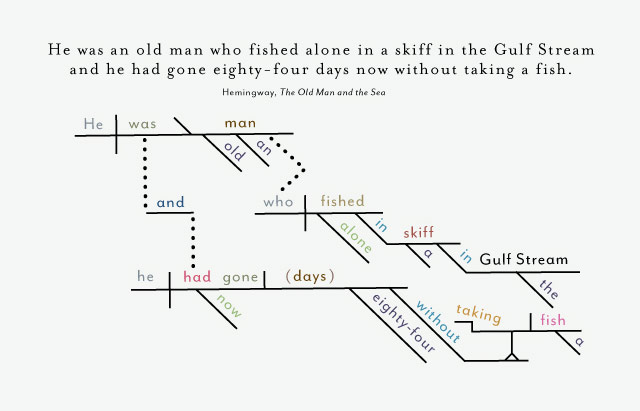
There are also sentences from DFW, Plath, and Austen. Prints start at $29.
While they still represent a small overall number, the popularity in the US of naming children after guns (Colt, Remington, Ruger, Gunner, Beretta) is up in recent years.
In 2002, only 194 babies were named Colt, while in 2012 there were 955. Just 185 babies were given the name Remington in 2002, but by 2012 the number had jumped to 666. Perhaps the most surprising of all, however, is a jump in the name Ruger’s (America’s leading firearm manufacturer) from just 23 in 2002 to 118 in 2012. “This name [Ruger] is more evidence of parents’ increasing interest in naming children after firearms,” Wattenberg writes. “Colt, Remington, and Gauge have all soared, and Gunner is much more common than the traditional name Gunnar.”
I don’t care if all of this vocabulary of NYC’s best bars is made up (it sure sounds made up), I still loved reading it. You can totally tell which places are about the drinks, which are about hospitality, which are bitchy, and which are all about the benjamins.
Sipper: A small pour (typically Mother’s Milk) gifted to a colleague, loved one, regular, etc.
Amuse-booze (experimental term): A tiny sipper to acknowledge a guest an reassure them they will be served soon.
The Cousins: Affectionate term for other cocktail bars (after the British secret service’s name for the CIA in Le Carre’s Smiley novels).
Even if it’s fake, it’s real.
Think you can distinguish between 80 of the world’s most spoken languages? Play the Great Language Game and find out. (Oof, I am bad at this.)
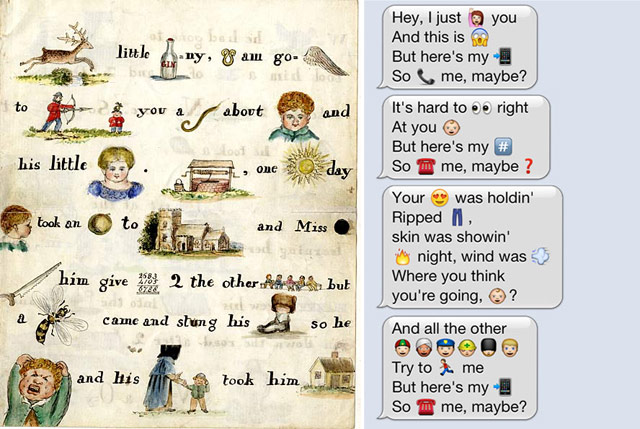
Using pictures to represent words dates back to Egyptian hieroglyphics and Chinese pictographs. But in the 1500s in France, a particular format of picture writing called the rebus was invented. A rebus is a word puzzle which uses pictures to represent words (or parts of words). The rebus became very popular in Europe and elsewhere. Here’s a French rebus from 1592:

Alice in Wonderland’s author, Lewis Carroll, was fond of rebuses…here’s the first page of a letter he wrote in 1869:
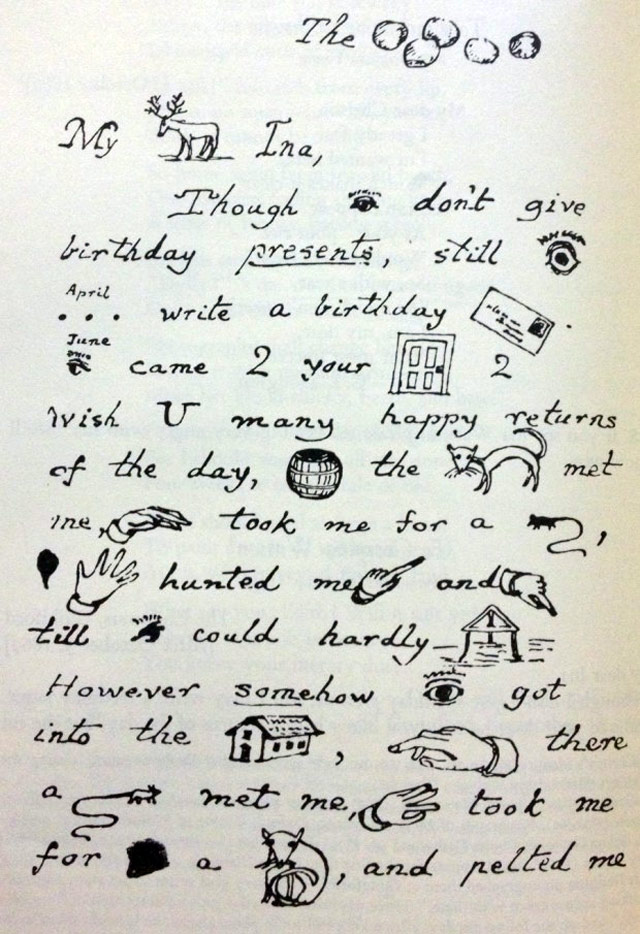
Compare the rebus with the use of emoji on mobile devices and social media, like this emoji version of the Fresh Prince of Bel Air theme song:

George Mason University’s speech accent archive collects English speech samples from all over the world. Each speaker is asked to say the same snippet of text:
Please call Stella. Ask her to bring these things with her from the store: Six spoons of fresh snow peas, five thick slabs of blue cheese, and maybe a snack for her brother Bob. We also need a small plastic snake and a big toy frog for the kids. She can scoop these things into three red bags, and we will go meet her Wednesday at the train station.
You’ve likely seen the various dialect maps of the US…the Coke/soda/pop maps. The Atlantic Video team did a wonderful thing with them…they called native speakers around the country and asked them to pronounce some of the words featured on these maps.
It’s one thing to read the difference between the pronounciations of “route”, it’s another thing entirely to hear them. I haven’t lived in the Midwest since 2000 and I have since transitioned from “pop” to “soda”, “waiting in line” to “waiting on line”, and am working on switching to “sneakers” from “tennis shoes” (or even “tennies”). But I was surprised to learn that I still pronounce “bag” differently than everyone else!
While researching the etymology of the word “fave”, a noun that’s in the process of being verbed,1 I noticed that, according to Google’s ngram viewer, the word was much more popular in the 1600-1700s than it is now.

A bit of investigation reveals that Google’s book-scanning software is at fault; it can’t recognize the long s commonly used in books prior to the 1800s. So each time it encounters “save” with a long s, it sees “fave”:
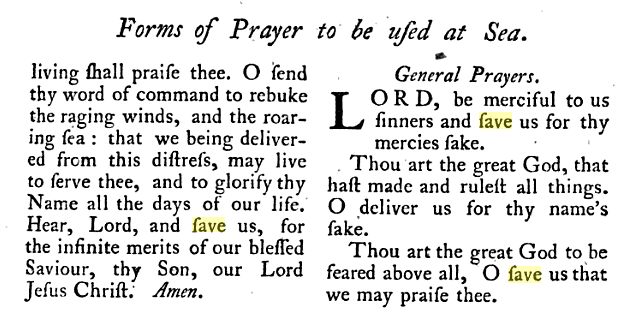
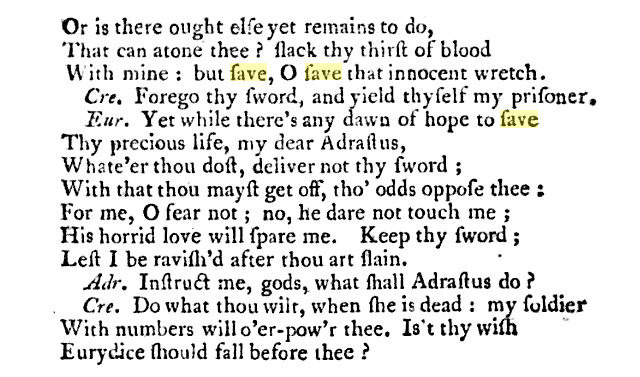
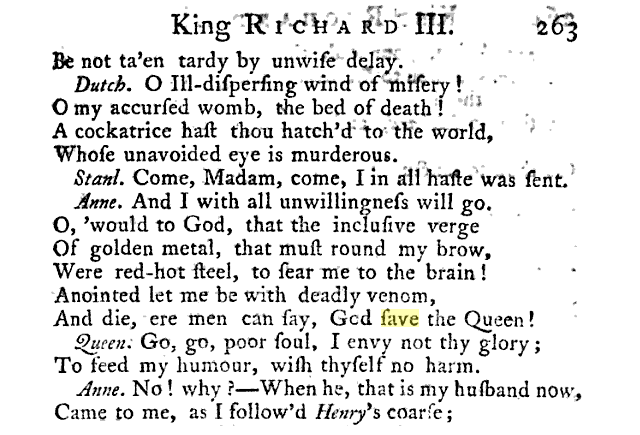
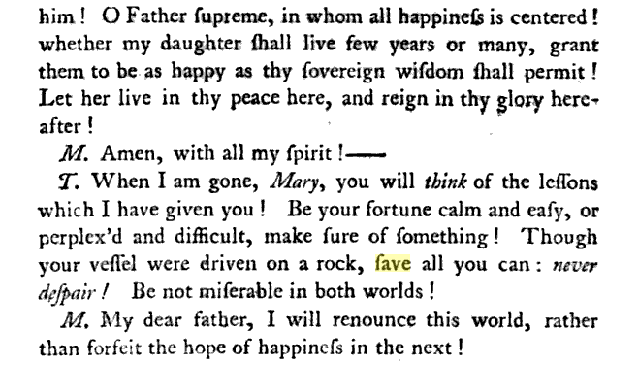
Newer posts
Older posts
































Stay Connected